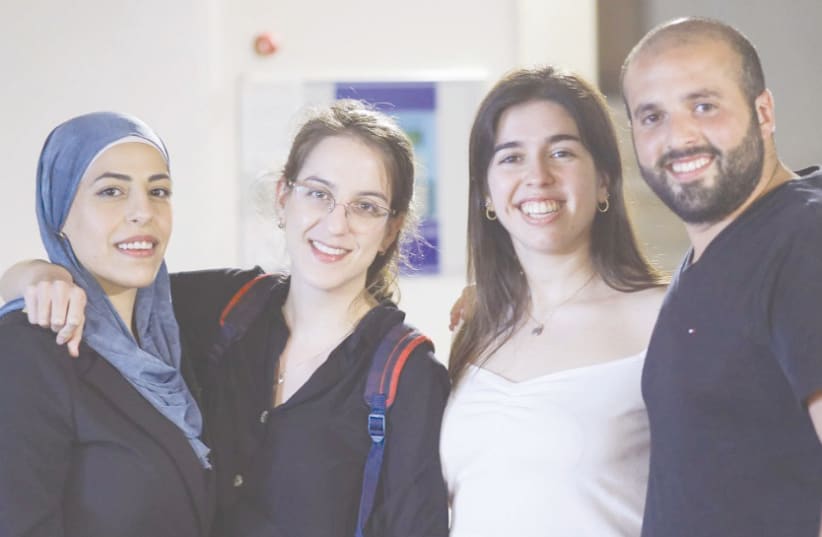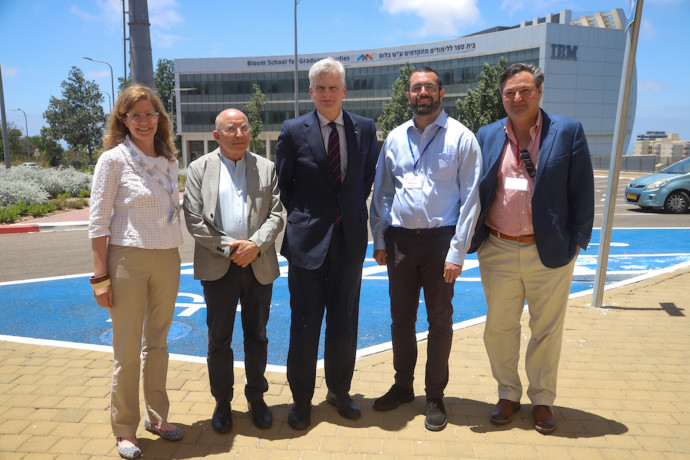Academia has, at times, been criticized as the metaphoric “ivory tower,” detached from the real world. I would argue against this sentiment and assert that our universities today play a bigger role as a beacon of hope for society than ever before.
Sitting atop the Carmel Mountain in northern Israel – uniquely interwoven with the city of Haifa and the Mediterranean Sea – University of Haifa has, in many ways, created a bubble of inclusivity, multiculturalism and co-existence that serves as an example to Israel, and indeed the world, that the impossible is possible.
At this year’s 50th Board of Governors meeting, that sense of shared society was brought to the forefront. From encounters with students, to faculty members sharing their research with potential donors and university leadership, I witnessed first-hand how harmony is not only possible but occurs routinely.
While sitting at the university’s law school, for example, a potential philanthropic partner asked an Arab student how she deals with discrimination.
“I focus on my work as a counselor with the middle school students,” she explained. “I don’t read the news. Instead, I work with these Jewish and Arab students together, allowing them to get to know each other. Typically, despite living in Haifa, our program is the first time the Arab students have actually spoken to a Jew and the same with regard for the Jews.” I was touched by the conviction in her response.
Similarly, a presentation from University of Haifa neuroscientist Dr. Hanin Karawani Khoury, a prolific researcher with no less than six published articles under her belt in 2022 alone, spoke about her recent findings on brain plasticity and auditory processing – another testament to an Arab woman making her mark at the university.
And she doesn’t need to look far for inspiration. Head of our Sagol Department of Neurobiology, Dr. Mouna Maroun is the first Arab woman in Israel to become a professor of neurobiology and to head a university department in neuroscience.
This is key not only for advancing the role of women in academia, but also for helping narrow the economic gaps between Jews and Arabs, fostering a reality where the two can, not only coexist but enjoy the closeness we are destined to have, as we both live on the same cherished sliver of land.
With 32% of the student body comprised of Arab students, we believe that University of Haifa has a critical role to play in forming cross-cultural bridges, shaping a more just society in Israel, enabling Arab students to take leadership positions, and helping Arab graduates successfully lead communities.
Diversity at U of Haifa
IT HELPS, of course, that University of Haifa is surrounded by a hotbed of diversity, in Israel’s rich and robust north. During the Board of Governors, we toured Mi’ilya, a Christian Arab village, led by university archaeologist and historian Dr. Rabei Khamisy.
There, he described how his team of researchers partnered with four families to conduct archeological digs around their homes. The findings were astonishing: Crusader and Byzantine ruins, including a winery, cistern and even a church.
As a local, Dr. Khamisy has helped foster trust between the families and the Israeli Antiquities Authority, which sped up approvals for all parties.
The university regularly does grassroots work in small Arab communities where current students speak with high school students about the opportunities available to them, thereby opening doors to students who would not have previously considered university education an option.
But more importantly, having our faculty and students sow seeds of hope and partnership across northern Israel and beyond, dovetails with the university’s mission to provide opportunities for all and to make it clear that partnerships should never be limited to religious affiliation.
This notion is also exemplified through the university’s Jewish-Arab Community Leadership Program, which fosters multicultural encounters among students to create leadership groups within the University and their local community.
CLP students identify opportunities to improve the social and/or educational conditions of the mixed Jewish-Arab population in the city of Haifa through service projects, while leading social community initiatives among the Jewish and Arab student populations on campus.
Social mobility at U of Haifa
Furthermore, University of Haifa is also the first university in Israel to define social mobility as a strategic objective. We believe that an inclusive system of higher education, with an emphasis on academic excellence for students from a variety of backgrounds, offers a critical engine for social mobility and strengthening Israeli society.
This inspiration is not limited to those within Haifa either, it is also exuded by our philanthropic partners, as well. These partners hail from the likes of Paris, Berlin, Chicago, Boston and San Paolo, to name just a few, and represent a variety of faiths, including Bahai, Christianity, Islam and Judaism.
Threaded together, we weave the fabric of tomorrow’s diversity, by integrating academic culture and opening the gates of higher education and social mobility to all.
Education is more than a piece of paper or license to pursue a specific set of skills; it’s a key to upward mobility, and the great equalizer between the haves and have-nots in society.
The writer is CEO of the American Society of the University of Haifa.

